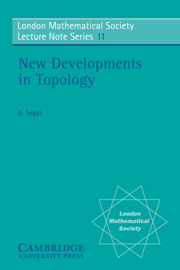Book contents
- Frontmatter
- Contents
- Preface
- 1 Operations of the nth kind in K-theory, and what we don't know about RP∞
- 2 The Pontrjagin dual of a spectrum
- 3 Algebraic K-theory of non-additive functors of finite degree
- 4 Dyer-Lashof operations in K-theory
- 5 Homotopy homomorphisms of Lie groups
- 6 On spherical fiber bundles and their PL reductions
- 7 E∞ spaces, group completions, and permutative categories
- 8 Higher K-theory for categories with exact sequences
- 9 Operations in stable homotopy theory
- 10 Equivariant algebraic K-theory
- 11 On rank 2 mod odd H-spaces
7 - E∞ spaces, group completions, and permutative categories
Published online by Cambridge University Press: 05 April 2013
- Frontmatter
- Contents
- Preface
- 1 Operations of the nth kind in K-theory, and what we don't know about RP∞
- 2 The Pontrjagin dual of a spectrum
- 3 Algebraic K-theory of non-additive functors of finite degree
- 4 Dyer-Lashof operations in K-theory
- 5 Homotopy homomorphisms of Lie groups
- 6 On spherical fiber bundles and their PL reductions
- 7 E∞ spaces, group completions, and permutative categories
- 8 Higher K-theory for categories with exact sequences
- 9 Operations in stable homotopy theory
- 10 Equivariant algebraic K-theory
- 11 On rank 2 mod odd H-spaces
Summary
In the last few years, a number of authors have developed competing theories of iterated loop spaces. Among the desirable properties of such a theory are:
(1) A recognition principle for n-fold loop spaces, 1 ≤ n ≤ ∞, which applies when n = ∞ to such spaces at Top, BF, PL/O, etc. and to the classifying spaces of categories with appropriate structure.
(2) An approximation theorem which describes the homotopy type of Ωn∑nX, 1 ≤ n ≤ ∞, in terms of iterated smash products of X and canonical spaces.
(3) A theory of homology operations on n-fold loop spaces, 1 ≤ n ≤ ∞, at least sufficient to describe H*Ωn ∑n X, with all structure in sight, as a functor of H*X.
(4) Computations and applications of the homology operations on interesting spaces to which (1) applies. In addition, rigor and aesthetics dictate (5) and suggest (6).
(5) Complete proofs of all non-trivial technical details are to be given.
(6) Only simple and easily visualized topological constructions are to be used.
Point (5) is particularly important since several quite plausible sketched proofs of recognition principles have foundered on seemingly minor technical details. At the moment, the author’s theory [17], which shall be referred to as [G], provides the only published solution to (1) and (2) which makes any claim to satisfy (5). For this reason, and because it includes the deeper cases 1 < n < ∞ of (1) and (2) as well as machinery designed for use in (3) and (4), [G] is quite lengthy.
- Type
- Chapter
- Information
- New Developments in Topology , pp. 61 - 94Publisher: Cambridge University PressPrint publication year: 1974
- 42
- Cited by



